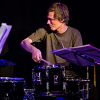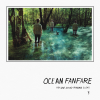Home » Jazz Articles » Album Review » Ocean Fanfare: First Nature
Ocean Fanfare: First Nature
Never one to shy away from ambitious endeavors, Dabrowski sees this record as the initial release in an anticipated trilogy inspired by the work of anthropologist Anna Tsing. First Nature has biodiversity as its theme; the second and third installments in 2020 and 2021 will address questions surrounding the impact of global capitalism and something called "temporal polyphony." Lest that sound a bit esoteric, the music fortunately speaks for itself, and it's not the least bit forbidding, although it can be austere. It is clear that Dabrowski's vision of the natural world isn't one of tumult and sudden transformations, but rather smaller microcosms in which minute interactions lead to gradual change and a delicate beauty that takes some time to emerge fully.
The band is virtually unchanged from its debut, with the exception of drummer Peter Bruun taking over from Sorey. The composing duties are shared almost equally between Dabrowski and Meinild, with Dabrowski getting the slight edge with five of the nine tracks. From the opening cut, "We Can't Stop Now," it is clear that there is a quiet confidence that animates the group's music. It's not ostentatious in the least, although it is demanding in its own way, with ideas that veer towards the abstract, and melodic fragments that often remain elusive. This is very much a musician's record, with dedicated craftsmanship that reveals its nuances in the subtle details rather than in easily accessible tunes. A characteristic track is the ironically titled "Importance of Madness," which isn't really evocative of insanity at all, but rather a carefully developed, almost chamber-like dialogue between Dabrowski and Meinild that is augmented by the fine layer of support offered by Andersson and Bruun. "Klangtrae" is a pensive, brooding piece with fragmentary phrases suspended in an ethereal state. A somewhat more overt melody is found on "Matsutake," the two horns sketching the haunting theme in unison and then in intertwined statements, with Andersson and Bruun following in sympathetic concord.
As most of the album stays within this rather reserved, even furtive, temperament, it is a pleasure to hear the group catch fire on the more up-tempo cuts. "Pony Squad" has a buoyant energy spurred by some particularly effective rhythmic momentum from Andersson and Bruun, while "Cordovan" may be the closest thing to post-bop jazz that this album offers, with a sinuous melody and room for Meinild and Dabrowski to dig into some first-rate solos. And another ironically named piece, "You Don't Look Very Cheerful" will in fact bring a smile to one's face as the group hits its stride with an infectious spirit and some superb exchanges between Dabrowski and Meinild. These tracks possess all of the group's balanced chemistry and rhythmic fluidity, but their additional vitality makes all the difference in providing a needed spark to an album that can sometimes feel emotionally distant.
It's always exciting to see a group continuing to forge its collective identity, and Dabrowski will hopefully find time amidst his many other endeavors to see this promised trilogy through to completion.
Track Listing
We Can’t Stop Now; Hjemmefødsel; Importance of Madness; Pony Squad; The Dialogues; Cordovan; Klangtrae; You Don’t Look Very Cheerful; Matsutake.
Personnel
Tomasz Dabrowski
trumpetSven Dam Meinild
saxophoneRichard Andersson
bass, acousticPeter Bruun
drumsAlbum information
Title: First Nature | Year Released: 2019 | Record Label: Barefoot Records
< Previous
Monty Alexander: Still Rolling
Next >
North Sea Jazz Festival 2019
Comments
Tags
For the Love of Jazz
 All About Jazz has been a pillar of jazz since 1995, championing it as an art form and, more importantly, supporting the musicians who create it. Our enduring commitment has made "AAJ" one of the most culturally important websites of its kind, read by hundreds of thousands of fans, musicians and industry figures every month.
All About Jazz has been a pillar of jazz since 1995, championing it as an art form and, more importantly, supporting the musicians who create it. Our enduring commitment has made "AAJ" one of the most culturally important websites of its kind, read by hundreds of thousands of fans, musicians and industry figures every month.






















